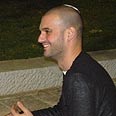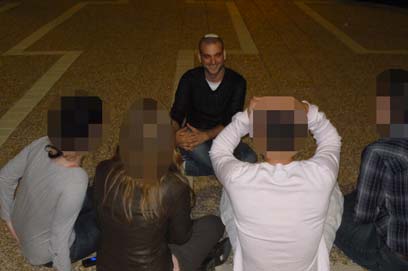
Religious gay teens find safe haven
Israel Gay Youth helps teens struggling with conflict between religious, sexual identity reach peace
"Most of the teens who come to us, especially the young ones, are still in the closet," says Gidi Grunberg, who coaches a group of older boys. "They hide their membership in the group even from their parents, so we are committed above all to their security and discretion."
This policy is IGY's first priority. "When a young man wants to join the group he must first interview with one of the counselors. We investigate his motives in order to make sure he has not come to do harm," Grunberg explains.
"The meetings do not take place at the spots usually associated with the LGBT community and there is a clear code that must never be violated – discussions that take place within the group must not be taken out of it, the members must never be named, and the meeting places and times must remain confidential."
If one member happens to meet another on the street he is not permitted to say hello unless given a secret signal, in order to avoid unpleasant questions by friends and acquaintances.
IGY has also made sure to provide its members with a special insurance policy, as parents and guardians are often unaware of their participation in the secret meetings. The Education Ministry also supports the program.

Grunberg with group: We do not shy away from taboo issues
Sometimes parents turn out to be supportive, despite fears. Grunberg recalls a phone call he received from one of the mothers. "I was sure that I was going to get a barrage of curses, but she thanked me," he says.
"It turns out that ever since (the teen) discovered his sexual tendencies he has been refusing to attend synagogue, but after returning from one of our meetings he said that for the first time he felt spiritually enlightened and agreed to go back to prayer."
'Glad to see I wasn't alone'
IGY has formed three religious youth groups – for boys aged 15-18, 18-23, and girls aged 16-22.
"The boys and girls deal with different issues, especially halacha-wise," explains Lital, a girls' counselor. "The boys have more difficult and complex issues and we've seen that it doesn't work to mix them up. We wanted the discussions to take place with maximum openness, and we assume that the kids will be more comfortable opening up to members of their own sex."
IGY also does not hide the fact that the groups provide a safe and comfortable place for meeting potential partners. "There is one couple I currently know of, and others dated for a while. And there are probably others we don't know of," Lital says.
Grunberg explains the nature of the activities. "Every meeting we discuss a different hot topic: Religion and homosexuality, gender and sexual differences, and social identity," he says.
"The older group reaches very intimate levels of discussion and we do not shy away from discussions on issues that are generally considered taboo, such as safe sex."
Eli, who belongs to the older group, says he joined IGY after years of inner turmoil caused by the conflict he felt between religious rites and his desire for members of his own sex.
"I was glad to see that I wasn't alone," he recounts. "The first meeting was scary in and of itself, coming to a crowded place was a big step forward for me. But something in the exposure strengthened me and made me feel I had come to the right place."
Eli adds that his first impulse had been to hide his sexual tendencies, which include attraction to both sexes, because of the conflict it created with religion. "Only when I came to IGY did I understand that there are more like me and they remain religious, and then I understood that it could work," he recalls.
Eli is still unclear on his sexual tendencies and his religious identity, as are many of his fellow group members. But the counselors make sure to remain objective and stress that there is no "brainwashing" going on.
No brainwashing
"We are here to lead them by the hand, to walk this path of deliberation with them," says Noa, a girls' counselor. "Even if someone decides in the end that she is not (a lesbian) and goes back to being straight or back to the closet, we respect her decision. There is no brainwashing here, and no one has to define their tendencies."
Grunberg explains that sexual identity should be perceived as a wide range rather than two polar extremes. "This range includes many different types of identities, and we appeal mainly to the undecided as their choices are most difficult," he says.
"After they make a decision, coming out of the closet becomes much easier. The stage of indecision is the most torturing stage and we don't want them to go through it alone. This is also true for religious identity."
When discussing religious questions with his pupils, Grunberg tries to be as objective as possible. "I present him with a wide range of opinions I heard on the matter. I would never guide him towards a specific strain of (Judaism), but I will be a party to his investigation and try to expose him to as much information as possible in order to help him make the best decision," he says.
'Flesh of the sector's flesh'
Noa feels IGY actually brings its members closer to religion. "When I was in the closet I didn't have a community to hold on to, so I renounced religion out of desperation. I never thought there was a way my faith could be incorporated with my sexual tendencies," she recounts.
"Joining a religious group helped me find a new family and I began to feel more of a belonging to Judaism than ever before. Today I am religious again, and I have inner peace as well as pure and simple faith."
Zohar, one of Noa's pupils, also renounced religion due to fears that her sexual tendencies would never comply with religious society. "If I had joined IGY a few years ago, I'm certain I would still be religious. What broke me was the thought that I would never find myself in religious society, that it wouldn't work," she recalls.
Grunberg says the internet has played a large part in progressing awareness of homosexuality in the religious community.
"Rabbis began receiving a flood of questions (online) and they could no longer ignore the phenomenon. LGBT organizations knocked on doors and demanded a halachic solution," he says.
"We are flesh of the sector's flesh and we want to continue attending synagogues and to feel like a part of the community. There is an awakening, there is talk, but we are still far from the goals we set for ourselves."
- Follow Ynetnews on Facebook










